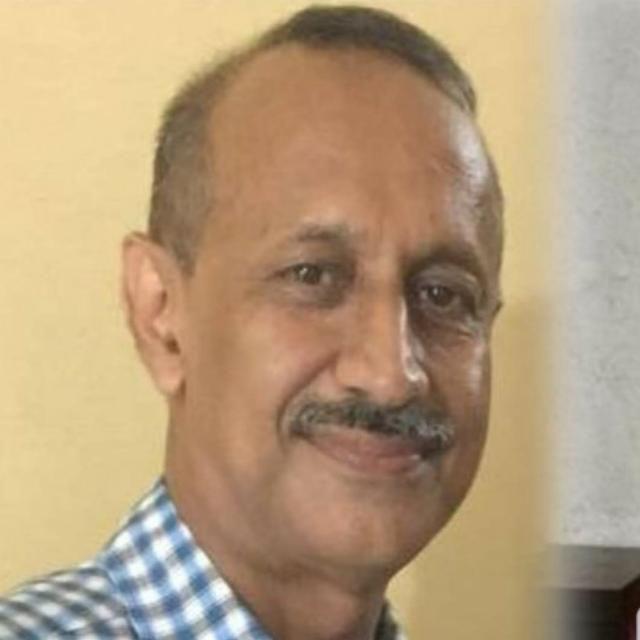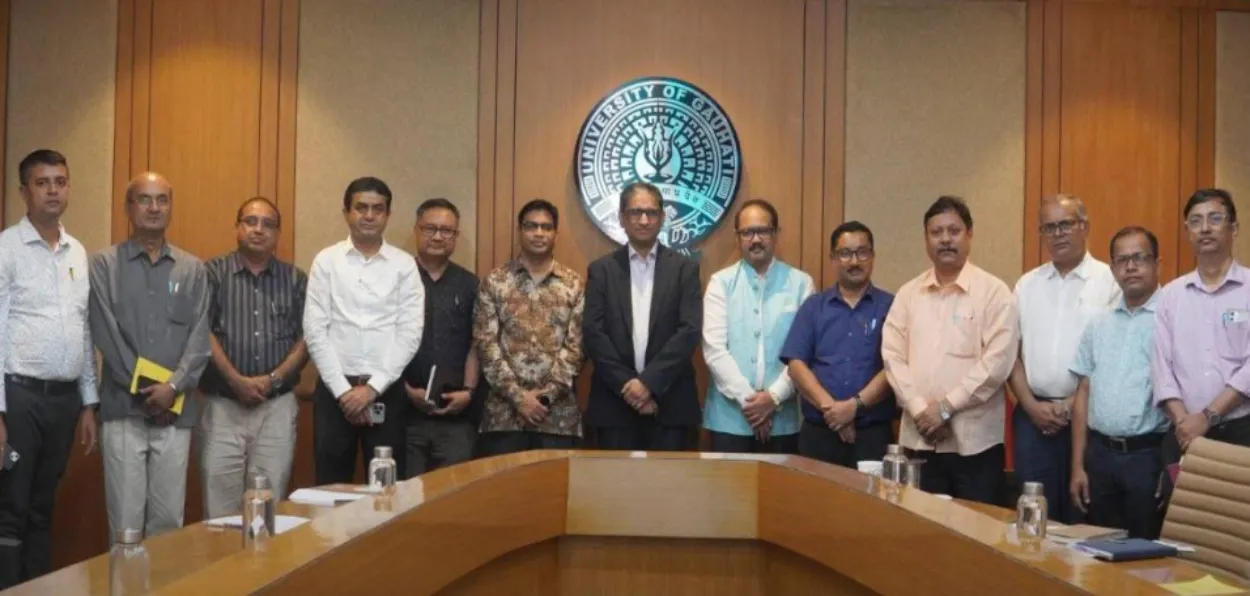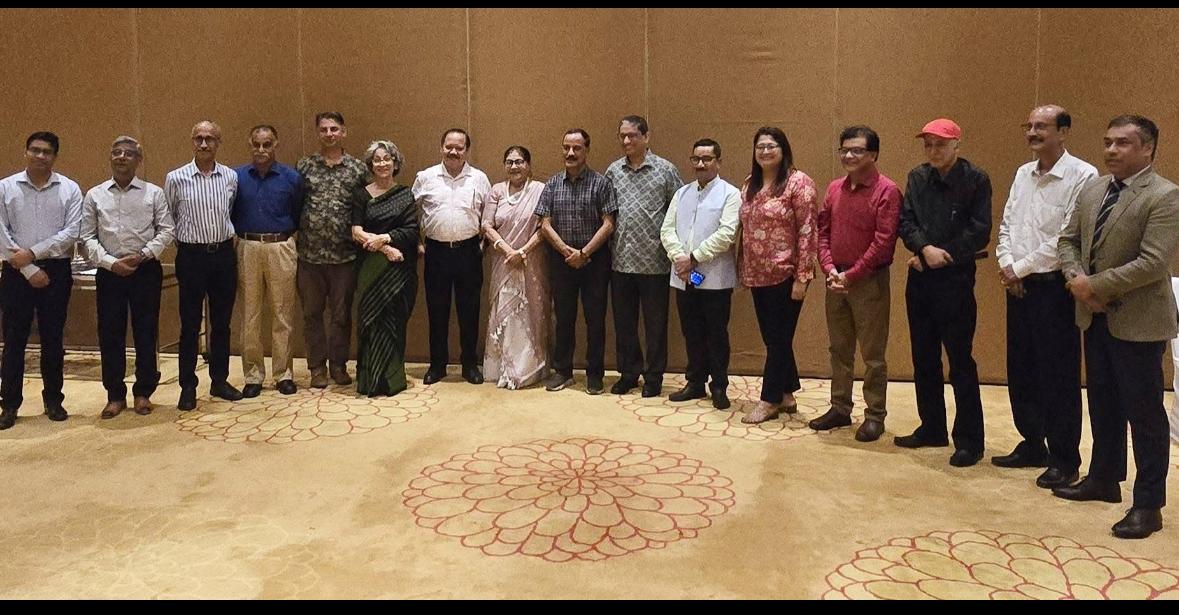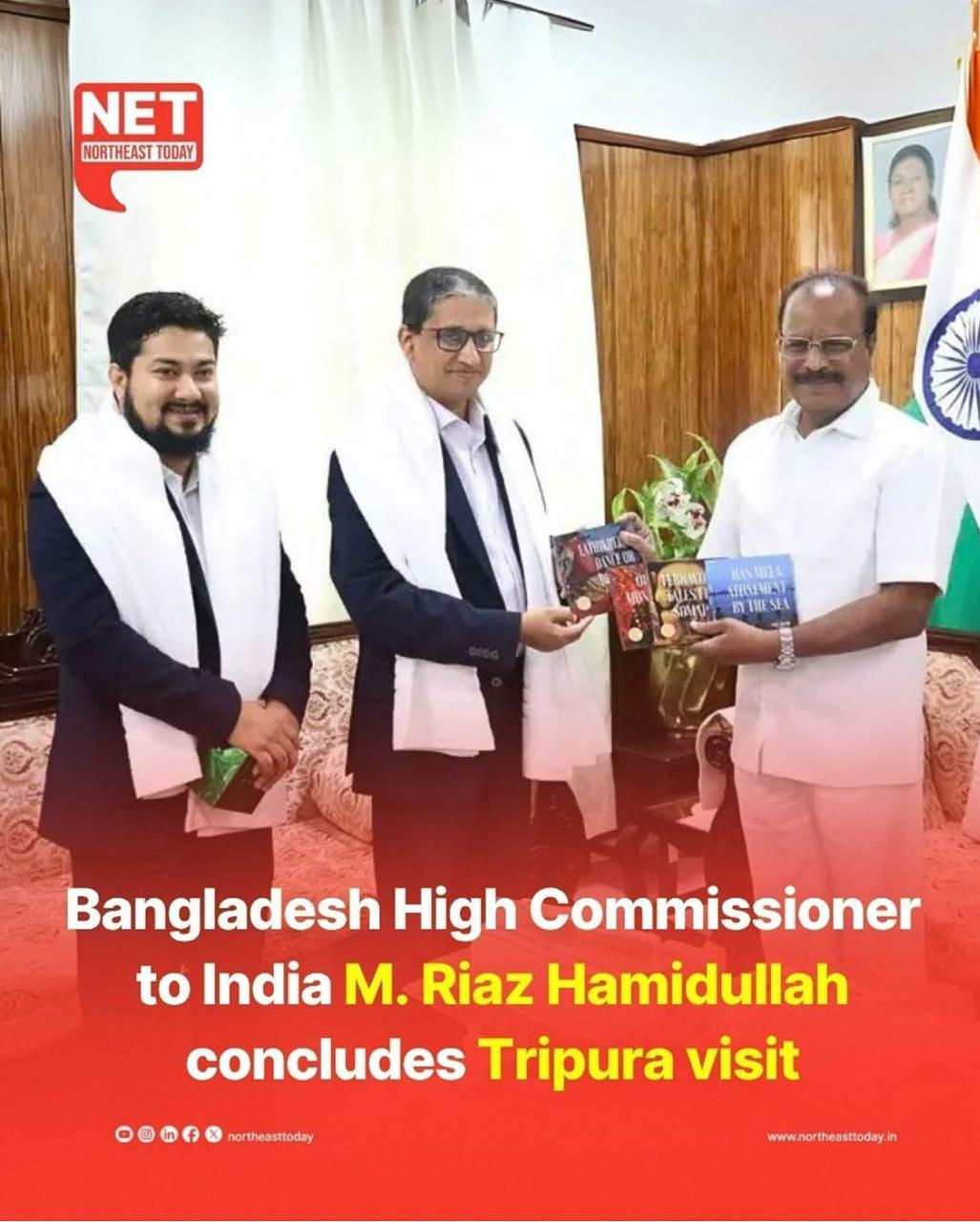Bangladesh High Commissioner to India, Muhammed Riaz Hamidullah (In the center) with the faculty of Guwahati University.
 Pallab Bhattacharyya
Pallab Bhattacharyya
On 30th July, the Bangladesh High Commissioner to India, Muhammed Riaz Hamidullah, organised an evening of conversations with a select group of citizens at Hotel Taj Vivanta Guwahati, where I had the opportunity to attend. This gathering was emblematic of the diplomatic philosophy that defines Riaz Hamidullah's approach to India-Bangladesh relations—rooted in genuine human connections forged through his experiences as a student in India during some of the country's most turbulent times.
When Hamidullah chose Aligarh Muslim University over prestigious American institutions in 1990, following his father's advice to pursue "heritage over convenience," he could hardly have imagined that this decision would shape not only his worldview but also his approach to one of South Asia's most complex diplomatic relationships. His journey from the corridors of AMU to the highest echelons of Bangladeshi diplomacy represents more than a career trajectory—it embodies the living bridge between two nations bound by history, geography, and shared aspirations.
During his formative years at Aligarh from 1990 to 1993, Hamidullah witnessed India navigate through seismic social and political upheavals. He lived through the Mandal Commission protests that introduced him to India's complex caste dynamics, experienced the devastating aftermath of the Babri Masjid demolition in 1992, and survived natural disasters, including the major Uttarkashi earthquake that left him stranded in the Himalayas. These experiences, rather than alienating him, deepened his understanding of India's pluralistic democracy and resilient spirit.
His linguistic struggle and eventual mastery of Urdu and Hindi became a metaphor for the broader cultural assimilation that would later shape his diplomatic philosophy. The young Bangladeshi student who once fumbled with local languages at Aligarh's markets would decades later advocate for reimagining bilateral cooperation "not as a legacy of the past, but as a strategic necessity for collective growth and resilience".
Hamidullah's diplomatic career, spanning three decades, has been marked by a consistent focus on multilateral economic diplomacy and regional cooperation. His tenure as Director at the SAARC Secretariat in Kathmandu from 2008 to 2011 provided him invaluable experience in navigating South Asian complexities. His subsequent ambassadorships to Sri Lanka and the Netherlands, where he served concurrently as ambassador to Croatia and Bosnia and Herzegovina, broadened his understanding of international relations while keeping South Asian connectivity at the centre of his work.
Bangladesh High Commissioner to India, Muhammed Riaz Hamidullah with the author (third from left)
Assuming his role as Bangladesh's High Commissioner to India in May 2025, Hamidullah arrived at a particularly challenging moment in bilateral relations. The political upheaval in Bangladesh following Sheikh Hasina's departure in August 2024 had strained ties between the two neighbours, with anti-India sentiment rising in Bangladesh and concerns about minority rights creating diplomatic friction. Where others might have seen insurmountable obstacles, Hamidullah perceived an opportunity for renewal.
His approach to normalizing present India-Bangladesh relations reflects the wisdom gained from his student years in India. Rather than formal diplomatic protocols alone, he emphasizes people-to-people connections, cultural bonds, and the organic relationship between the two nations. During Bangladesh's delayed Independence Day celebration in New Delhi in June 2025, he articulated this vision: "Bound by shared geography, shared ecology, and a shared linguistic and cultural heritage, our two peoples embrace each other with respect and dignity".
The High Commissioner's strategy for diplomatic normalization operates on multiple levels. He has actively engaged with Indian leadership, presenting his credentials to President Droupadi Murmu with emphasis on youth connections and shared prosperity. His visits to border states like Tripura, where he inspected critical infrastructure projects including the Maitri Setu and Sabroom Integrated Check Post, demonstrate his commitment to practical cooperation over political rhetoric.
Hamidullah's diplomatic philosophy draws heavily from his student experiences of witnessing India's resilience during a crisis. His frequent invocation of John Kenneth Galbraith's description of India as a "functioning anarchy" that continues to prosper reflects his deep appreciation for India's democratic durability. This understanding allows him to navigate current tensions with confidence that the fundamental relationship between the two nations transcends temporary political difficulties.
Bangladesh High Commissioner to India, Muhammed Riaz Hamidullah with Trupura Governor Indrasena Reddy Nallu
The water-sharing disputes, particularly over the Teesta River, remain among the most challenging issues in the bilateral relationship. Hamidullah's approach acknowledges these structural problems while advocating for comprehensive solutions that consider the needs of all stakeholders. His emphasis on "equity, fairness, and dignity" in bilateral relations reflects a mature understanding that sustainable agreements require addressing power asymmetries rather than merely managing them.
His vision extends beyond traditional diplomacy to encompass economic cooperation, educational exchanges, and cultural connectivity. The energy-sharing milestone he highlighted, where Nepal exports electricity to Bangladesh via Indian infrastructure, exemplifies his belief in sub-regional cooperation as a pathway to broader regional integration. His support for initiatives like the "Bridge to Bangladesh" program demonstrates his commitment to engaging diaspora communities in strengthening bilateral ties.
As Bangladesh chairs BIMSTEC and navigates its transition toward democratic renewal, Hamidullah's role becomes increasingly significant. His unique background—combining intimate knowledge of Indian society with deep commitment to Bangladeshi sovereignty—positions him as an ideal architect of the relationship's next phase. His advocacy for reimagining cooperation "as a strategic necessity for collective growth and resilience" offers a framework for moving beyond historical grievances toward shared prosperity.
The conversations at Guwahati represent more than diplomatic courtesy; they embody Hamidullah's conviction that the India-Bangladesh relationship must be built on authentic human connections rather than merely transactional arrangements. His journey from an uncertain student struggling with local languages to a seasoned diplomat facilitating regional cooperation demonstrates that the strongest diplomatic foundations are often personal ones. In an era of rising nationalism and zero-sum thinking, Riaz Hamidullah's approach offers a refreshing alternative—one that recognizes that neighbours cannot change geography but can choose to transform their relationship.
His life's work suggests that the future of India-Bangladesh relations lies not in forgetting the past but in building upon its lessons to create a more equitable and prosperous shared future. As he continues to bridge differences through dialogue and understanding, Hamidullah embodies the hope that diplomacy, grounded in genuine human experience and mutual respect, can indeed heal historical wounds and build lasting partnerships.
Pallab Bhattacharyya is former DGP of Assam Police

 Pallab Bhattacharyya
Pallab Bhattacharyya

